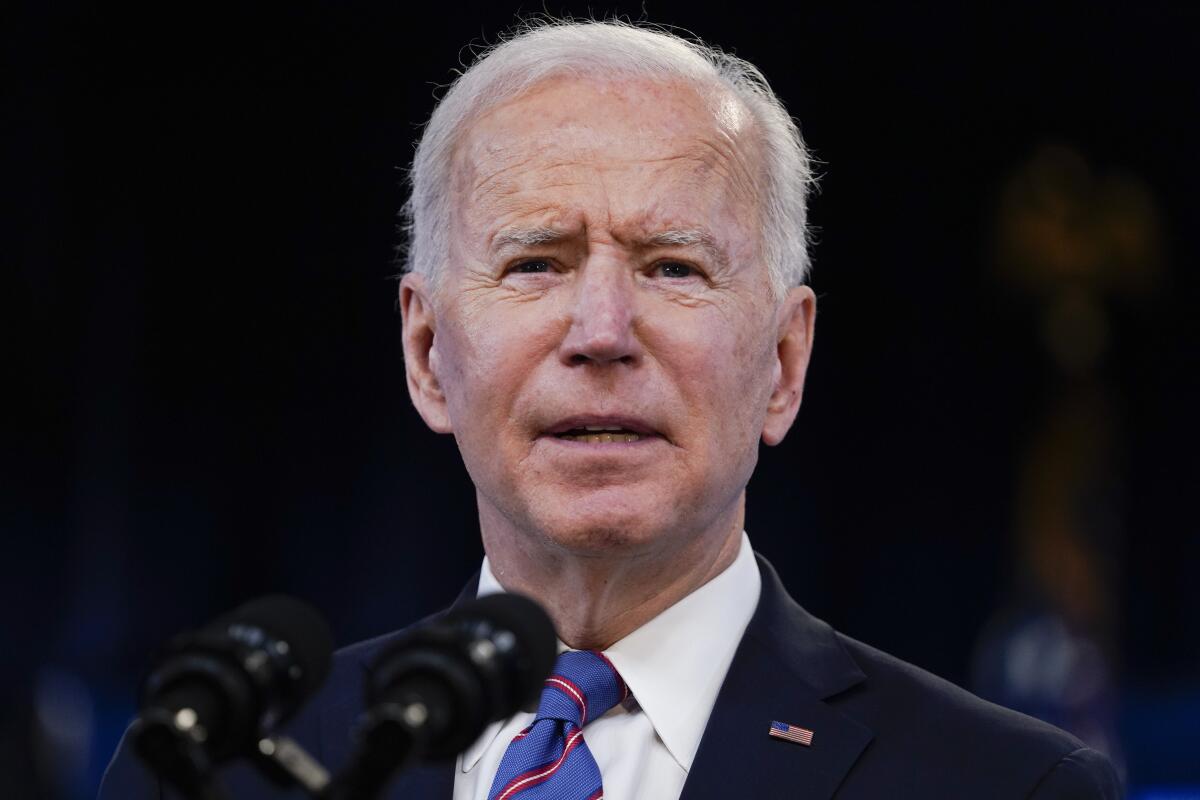Editorial: Biden must undo Trump’s original sin on the Iran nuclear deal

On Tuesday, representatives of the United States, Iran and several other nations will gather in Vienna to try to revive the 2015 agreement that placed significant obstacles in the path of Iran developing nuclear weapons.
Unfortunately, the U.S. and Iranian representatives aren’t expected to engage in direct negotiations. That’s one sign of how difficult it will be to reinvigorate the Joint Comprehensive Plan of Action, which President Trump recklessly repudiated in 2018.
President Biden must make it clear that his administration is willing to move quickly to lift the sanctions reimposed by Trump if Iran agrees to return to full compliance with the agreement. And he and his diplomats should be open to creative ways to have the U.S. and Iran act simultaneously to fulfill their obligations.
The stakes are high — a nuclear-armed Iran would be deeply destabilizing and could lead to a regional nuclear arms race — and time may be running out. Iran will hold a presidential election in June to replace incumbent President Hassan Rouhani, who cannot run for a third consecutive term. Rouhani was considered by some analysts to be less of a hardliner than the conservatives who now dominate the Iranian parliament; his successor could be more resistant to complying with the agreement even if the U.S. lifted sanctions.
The Obama administration negotiated the 2015 agreement with Iran, the four other permanent members of the United Nations Security Council, Germany and the European Union. Iran agreed to significant limitations on its nuclear program — including inspections by international atomic energy experts — in exchange for the lifting of economic sanctions.
Despite evidence that Iran was complying with its obligations, Trump withdrew from the agreement, not coincidentally dismantling one of the major achievements of his immediate predecessor. Iran reacted by intensifying its uranium enrichment program well beyond the limits set by the 2015 deal and curtailing access by international inspectors.
During the campaign, Biden said that the United States would rejoin the Joint Comprehensive Plan if Iran returned to strict compliance. But his comments left the impression in some minds that Iran had to act first.
Constraining Iran’s nuclear program is too important an objective to be blocked by a dispute over whether Iran or the U.S. makes the first move. Surely diplomats are ingenious enough to arrange for simultaneous declarations by the two countries that they are taking steps to return to compliance.
On Monday a State Department spokesman said that the purpose of the Vienna conversations was to set the stage for a “mutual return to compliance,” but he also said that the U.S. wouldn’t “cut corners.” Certainly deft diplomacy will be necessary, but the administration shouldn’t let the talks drag on endlessly.
Historical context is important here. It was the U.S. that began the undermining of the nuclear deal. The Trump administration went on to engage in a policy of “maximum pressure” on Iran, a scorched-earth campaign of economic sanctions that seemed like an attempt at regime change. That policy proved a dismal failure, even as it took a heavy toll on the Iranian people.
Given that history, it’s not surprising that Iran is skeptical of U.S. intentions. But if Biden is committed to reversing Trump’s blunder, he must go the extra mile to demonstrate that he supports the 2015 agreement. That includes pushing back at members of Congress who never supported it in the first place.
The Biden administration would like to build on the deal with what Secretary of State Antony Blinken calls a “longer and stronger” agreement. The administration has further concerns about Iran’s ballistic missile program and its support for militant groups elsewhere in the Middle East.
But the best way to engage Iran on these other issues is to undo the original sin of Trump’s repudiation of the Joint Comprehensive Plan — so that Iran has no excuse to violate it.
More to Read
A cure for the common opinion
Get thought-provoking perspectives with our weekly newsletter.
You may occasionally receive promotional content from the Los Angeles Times.










